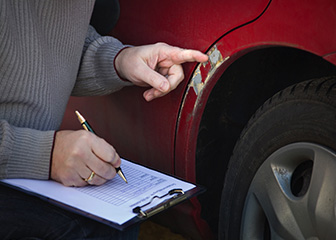
Dealing with Your Insurance Company When Your Car Is TotaledIf your insurance company determines that your car is a total loss (i.e., your car has been totaled), they will perform research to determine the market value of your car and then offer this amount to you. Oftentimes, this appraisal will be less than you were hoping for and maybe less than is actually fair. Here is some advice on how to get the maximum value for your car:
Insurance Companies Perform Skewed Research When your insurance company performs research to determine the market value of your car, they often exclude cars that are priced higher than the amount they want to pay. In other words, they limit the market they research to those cars that are at a lower price. So, their research may not indicate actual market conditions. You have a right to a copy of the report you insurance company comes up with. Be sure to ask for a copy before making you decision.
Perform Your Own Research
You don't have to (and probably shouldn't) accept your insurance companies first offer. You can perform your own research to determine the value of your car. One of the easiest places to look is on the internet. Cars are constantly being sold on the internet and you can look for a car just like yours (same make, model, year, features, etc.). Make a list of the prices you come up with and average them.
Find Out the Blue Book Value of Your Car.
Your insurance company probably won't offer you the Blue Book value of your car. This is because insurance companies are not required by law to pay you the Blue Book value. You should find out the Blue Book trade in value for your car. This can be done on the internet. Once you know the blue Book value of your car, let your insurance company know.
Compare Your Research with Their Research.
When you receive the copy of your insurance company's report, compare it to the research you have performed. It may be that much of what you found is not on your insurance company's report. Send a copy of your research to your insurance company and politely ask them to raise their original offer in accordance with what you found.
Carefully Read Through Your Insurance Company's Report.
The report you receive from your insurance company is supposed to contain comparable vehicles that are available in your local market. Be sure to go through the listings. Check to see if any of the listings are old and how far away they are. Anything over 75 miles away is not in your local market. Some of the listings may no longer be available. Verify the information if you can. Highlight out of date, unavailable, and/or distant listings and show them to your insurance company.
Options, Options, Options
The options on a car can make a huge difference. Things like a CD player, power windows, power locks, and leather interiors can add a lot of value to a car. Your insurance company may not take these options into account when determining the value of your car. Find out the Blue Book value of your car with the options and then without and note the difference. Tell your insurance company you want the difference included.
Present your Car and Yourself in a Good Light
If there are good aspects about your car, inform your insurance company. For example, low mileage and never having been involved in an accident can add value to your car. Also, when dealing with your insurance company, be very polite and respectful. If their offer is unreasonably low, you can take them to small claims court.
Know the Law
Each state has its own laws regarding how insurance companies must operate. Insurance companies also have a covenant of good faith and fair dealing they must abide by. If your insurance company violates this covenant or breaks some other law, you may be able to bring a case.
If your insurance company won't listen to you or treats you unfairly, call us Today to help!
Insurance Companies Perform Skewed Research When your insurance company performs research to determine the market value of your car, they often exclude cars that are priced higher than the amount they want to pay. In other words, they limit the market they research to those cars that are at a lower price. So, their research may not indicate actual market conditions. You have a right to a copy of the report you insurance company comes up with. Be sure to ask for a copy before making you decision.
Perform Your Own Research
You don't have to (and probably shouldn't) accept your insurance companies first offer. You can perform your own research to determine the value of your car. One of the easiest places to look is on the internet. Cars are constantly being sold on the internet and you can look for a car just like yours (same make, model, year, features, etc.). Make a list of the prices you come up with and average them.
Find Out the Blue Book Value of Your Car.
Your insurance company probably won't offer you the Blue Book value of your car. This is because insurance companies are not required by law to pay you the Blue Book value. You should find out the Blue Book trade in value for your car. This can be done on the internet. Once you know the blue Book value of your car, let your insurance company know.
Compare Your Research with Their Research.
When you receive the copy of your insurance company's report, compare it to the research you have performed. It may be that much of what you found is not on your insurance company's report. Send a copy of your research to your insurance company and politely ask them to raise their original offer in accordance with what you found.
Carefully Read Through Your Insurance Company's Report.
The report you receive from your insurance company is supposed to contain comparable vehicles that are available in your local market. Be sure to go through the listings. Check to see if any of the listings are old and how far away they are. Anything over 75 miles away is not in your local market. Some of the listings may no longer be available. Verify the information if you can. Highlight out of date, unavailable, and/or distant listings and show them to your insurance company.
Options, Options, Options
The options on a car can make a huge difference. Things like a CD player, power windows, power locks, and leather interiors can add a lot of value to a car. Your insurance company may not take these options into account when determining the value of your car. Find out the Blue Book value of your car with the options and then without and note the difference. Tell your insurance company you want the difference included.
Present your Car and Yourself in a Good Light
If there are good aspects about your car, inform your insurance company. For example, low mileage and never having been involved in an accident can add value to your car. Also, when dealing with your insurance company, be very polite and respectful. If their offer is unreasonably low, you can take them to small claims court.
Know the Law
Each state has its own laws regarding how insurance companies must operate. Insurance companies also have a covenant of good faith and fair dealing they must abide by. If your insurance company violates this covenant or breaks some other law, you may be able to bring a case.
If your insurance company won't listen to you or treats you unfairly, call us Today to help!





 RSS Feed
RSS Feed